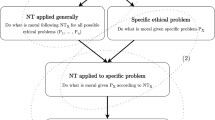Abstract
I begin by describing my relation with Nicholas Sturgeon and his objections to things I have said about moral explanations. Then I turn to issues about moral relativism. One of these is whether a plausible version of moral relativism can be formulated as a claim about the logical form of certain moral judgments. I (now) agree that is not a good way to think of moral relativism. Instead, I think of moral relativism as a version of moral realism. I compare moral relativism with the relativity of motion and with the relativity of language. Moralities are real in a way that is similar to the way that languages are real. Next I discuss resemblances between nonhuman animal behavior and human behavior having to do with language or communication and with moral or proto-moral behavior. However, I am more interested in aspects of language and morality that are not found in nonhuman animals, aspects that appear to depend on a kind of recursive structure in human language and morality but not in animals. This leads me to argue that aspects of moral theory might benefit from a comparison with certain aspects of linguistic theory. Another comparison is between moralities and legal systems: I speculate that the content of legal and moral systems is influenced by legal and moral bargaining.
Similar content being viewed by others
References
Brink, D. (1989). Moral realism and the foundations of ethics. Cambridge: Cambridge University Press.
Chomsky, N. (2010). Some simple evo-devo theses: How true might they be for language? In R. K. Larson, V. Deprez, & H. Yamakido (Eds.), The evolution of human language: Biolinguistic perspectives (pp. 45–62). Cambridge: Cambridge University Press.
Davidson, D. (1969). On saying that. In D. Davidson & J. Hintikka (Eds.), Words and objections (pp. 158–174). Dordrecht: D. Reidel.
Fiske, A. P. (1991). Structures of social life: The four elementary forms of human relations. New York: Free Press.
Fiske, A. P. (1992). The four elementary forms of sociality: Framework for a unified theory of social relations. Psychological Review, 99, 689–723.
Harman, G. (1975). Moral relativism defended. Philosophical Review, 84(1), 3–22.
Harman, G. (1977). The nature of morality: An introduction to ethics. Oxford: Oxford University Press.
Harman, G. (1983). Human flourishing, ethics, and liberty. Philosophy and Public Affairs, 12, 307–322.
Harman, G. (1998–1999). Moral philosophy meets social psychology: Virtue ethics and the fundamental attribution error. Proceedings of the Aristotelian Society, 99, 229–248.
Harris, J. R. (1998). The nurture assumption: Why children turn out the way they do. New York: The Free Press.
Lewis, D. (1975). Languages and language. In K. Gunderson (Ed.), Language mind and knowledge. Volume 7 of Minnesota studies in the philosophy of science (pp. 3–35). Minneapolis: University of Minnesota Press.
Lyons, D. (1976). Ethical relativism and the problem of incoherence. Ethics, 86, 107–121.
Miller, R. (1979). Reason and commitment in the social sciences. Philosophy and Public Affairs, 8, 261–262.
Miller, R. (2001). Moral realism. In L. C. Becker (Ed.), Encyclopedia of ethics (2nd ed.). New York: Routledge.
Rovane, C. (2011). Relativism requires alternatives, not disagreement or relative truth. In S. D. Hales (Ed.), A companion to relativism (pp. 31–52). New York: Wiley-Blackwell.
Sarkissian, H., Park, J., Tien, D., Wright, J. C., & Knobe, J. (2011). Folk moral relativism. Mind and Language, 26, 482–505.
Schweder, R. A., Much, N., Mahapatra, C., & Park, L. (1997). The ‘big three’ of morality (autonomy, community, divinity) and the ‘big three’ explanations of suffering. In A. Brandt & P. Rozen (Eds.), Morality and health (pp. 119–169). New York: Routledge.
Sturgeon, N. (1988). Moral explanations. In G. Sayre-McCord (Ed.), Essays on moral realism (pp. 229–255). Ithaca, NY: Cornell University Press.
Sturgeon, N. (1994). Moral disagreement and moral relativism. Social Philosophy and Policy, 11(1), 80–115.
Author information
Authors and Affiliations
Corresponding author
Rights and permissions
About this article
Cite this article
Harman, G. Moral relativism is moral realism. Philos Stud 172, 855–863 (2015). https://doi.org/10.1007/s11098-014-0298-8
Published:
Issue Date:
DOI: https://doi.org/10.1007/s11098-014-0298-8




